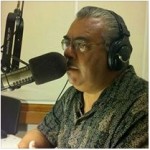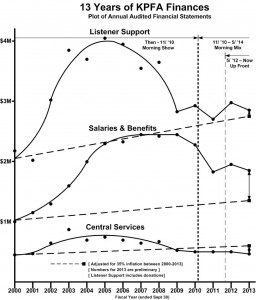By Akio Tanaka 10-15-15
[KPFA LSB Member 2006-2012]
Underlying Problems
Whenever there is a conflict, there is always an escalation in rhetoric, such as the divisive and inflammatory charge a few years ago that the Pacifica National Office engaged in union busting, and the labeling of volunteers who worked on the Morning Mix as scabs. We should avoid getting caught up in rhetoric and address real problems and concerns.
The underlying problem is financial. The trauma of the layoffs in 2010 was the consequence of the station increasing the payroll by 140% between 2000 and 2009. Even with the cuts made in 2010, income has not kept up with the expenses.
One area of friction is programming. It stands to reason that a trade union looking after the financial security of its members will prefer programming which appeals to a more affluent audience. But the mission of Pacifica is to be the commons of the airwaves, to represent a broader and more diverse community, to include marginalized and under-represented voices. (Lew Hill, the founder of Pacifica, was a conscientious objector. One program exemplifying this diversity – and which saved KPFA money — was the Morning Mix, which included members of the local activist community, like Peter Phillips of Project Censored, Andres Soto of Richmond Progressive Alliance, and the well-produced “Poor News” and “Strike Debt” segments. However, in 2014 it was inexplicably replaced by a show produced in L.A. rather than being supported and improved by KPFA paid staff. (Paid staff member Davey D did support this show.)
An area of friction is the working relationship between paid and unpaid staff. Originally, both were represented by one union. In 1996, it was replaced by a union which only represented the paid staff. This created a class system resulting in an uneasy working relationship between the paid and the unpaid staff.
Possible Solutions
So what to do with these conflicting needs and interests? How does a union look after the financial security of its members in a non-profit organization that relies on donations by listeners and must live within a balanced budget?
The management and the union should work out a staffing level that is sustainable over the economic ups and downs, and avoid the temptation to add more paid staff during the economic boom times as happened in 2001-2006. Achieving a sustainable paid staffing level is a challenge, but it would help address the main source of tension. It could curtail the seemingly endless appeal for funds.
The primary task of the station should be to fulfill the mission of Pacifica.
It is important to note that KPFA has always relied on a large number of volunteers (e.g. Alan Watts), who produce the majority of programming. At KPFA there simply is not enough money to pay all those who contribute to the station. Progressive organizations like KPFA should have one all-inclusive union for everyone who works at the station. While the notion of workers’ rights resonates to all within the progressive community, it must be remembered that it is about respecting and honoring ALL workers.
Instead of taking sides, we as listeners should encourage the paid and unpaid staff to work together and help each other to produce the best in progressive radio. It is time for the staff, paid and unpaid, and for the listeners to embrace the democratic victory that was won in the legal and street battles of 1999-2001. It is time to stop dividing the station.
- Listener Support:
The audited financials show that steep decline in Listener Support occurred between 2006 and 2009 before cuts were made in 2010. (Adjusted for inflation, since 2010, Listener Support is back to the 2000 level, irrespective of the morning programming line-up.)
- Salary and Benefits:
The audited financials show that between 2002 and 2006, the station added way too many people (the payroll more than doubled), and between 2006 and 2010, the station, understandably, did not address the steep decline in Listener Support. By the fall of 2010, the station was in danger of insolvency, which is the only reason that the Pacifica National Office stepped in, to bring expenses in line with income. (Adjusted for inflation, even with the cuts that were made in 2010, the current Salaries and Benefits are still above the 2000 level.)
- Central Services:
Central Services pay for network administrative services like FCC licenses, audit, insurance, legal, Pacifica archives, and national programming like Democracy Now! (Adjusted for inflation, since 2010, Central Services has been below the 2000 level.)






